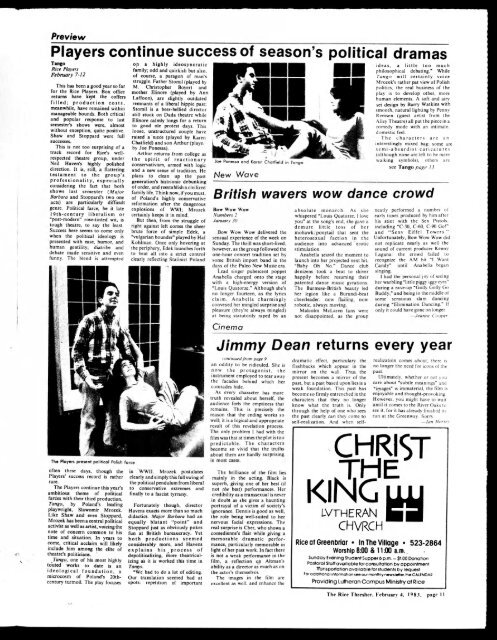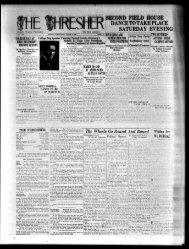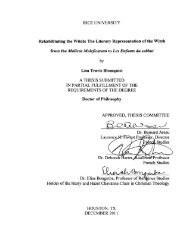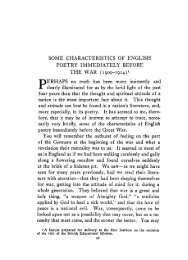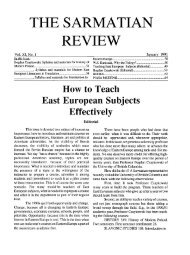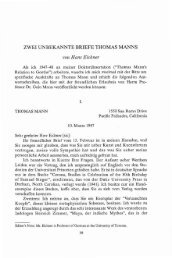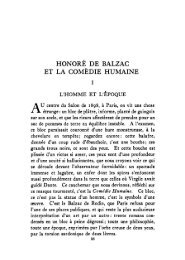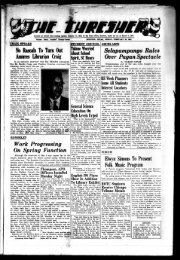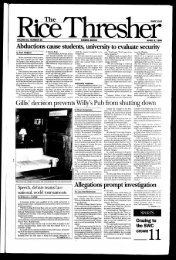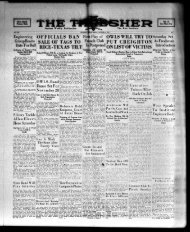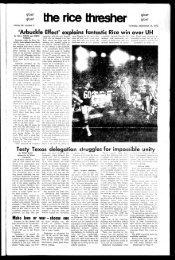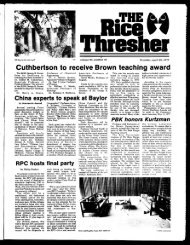A" -rf Hackerman shrugs off low ratings of grad programs - Rice ...
A" -rf Hackerman shrugs off low ratings of grad programs - Rice ...
A" -rf Hackerman shrugs off low ratings of grad programs - Rice ...
Create successful ePaper yourself
Turn your PDF publications into a flip-book with our unique Google optimized e-Paper software.
Preview<br />
Players continue success <strong>of</strong> season's political dramas<br />
Tango<br />
<strong>Rice</strong> Players<br />
February 7-12<br />
This has been a good year so far<br />
for the <strong>Rice</strong> Players. Box <strong><strong>of</strong>f</strong>ice<br />
returns have kept the c<strong><strong>of</strong>f</strong>ers<br />
filled; production costs,<br />
meanwhile, have remained within<br />
manageable bounds. Both critical<br />
and popular response to last<br />
semester's shows were, almost<br />
without exception, quite positive.<br />
Shaw and Stoppard were full<br />
successes.<br />
This is not too surprising <strong>of</strong> a<br />
track record for <strong>Rice</strong>'s wellrespected<br />
theatre group, under<br />
Neil Haven's highly polished<br />
direction. It is, still, a flattering<br />
testament to the group's<br />
pr<strong>of</strong>essionality, especially<br />
considering the fact that both<br />
shows last semester (Major<br />
Barbara and Stoppard's two one<br />
acts) are particularly difficult<br />
genre. Political farce, be it late<br />
19th-century liberalism or<br />
"post-modern" rose-tinted wit, is<br />
tough theatre, to say the least.<br />
Success here seems to come only<br />
when the political ideology is<br />
presented with ease, humor, and<br />
human gentility; diatribe and<br />
debate made sensitive and even<br />
funny. The blend is attempted<br />
The Players present political Polish farce<br />
<strong>of</strong>ten these days, though the<br />
Players' success record is rather<br />
rare.<br />
The Players continue this year's<br />
ambitious theme <strong>of</strong> political<br />
farces with their third production,<br />
Tango, by Poland's leading<br />
playwright, Slawomir Mrozek.<br />
Like Shaw and even Stoppard,<br />
Mrozek has been a central political<br />
activist as well as artist, voicing the<br />
note <strong>of</strong> concern common to his<br />
time and situation. In years to<br />
come, critical acclaim will likely<br />
include him among the elite <strong>of</strong><br />
theatre's politicians.<br />
Tango, one <strong>of</strong> his most highly<br />
touted works to date is an<br />
ideological foundation, a<br />
microcosm <strong>of</strong> Poland's 20thcentury<br />
turmoil. The play focuses<br />
on a highly ideosyncratic<br />
family; odd and quirkish but also,<br />
<strong>of</strong> course, a paragon <strong>of</strong> man's<br />
struggle. Father Stomil (played by<br />
M. Christopher Boyer) and<br />
mother Elinore (played by Ann<br />
Laffoon), are slightly outdated<br />
remnants <strong>of</strong> a liberal hippie past;<br />
Stomil is a beer-bellied director<br />
still stuck on Dada theatre while<br />
Elinore calmly longs for a return<br />
to good ole protest days. This<br />
loose, unstructured couple have<br />
raised a niece (played by Karen<br />
Chatfield) and son Arthur (playe><br />
by Joe Ponessa).<br />
Arthur returns from college as<br />
the spirit <strong>of</strong> reactionary<br />
conservativism, armed with logic<br />
and a new sense <strong>of</strong> tradition. He<br />
plans to clean up the past<br />
generation's histrionic debunking<br />
<strong>of</strong> order, and reestablish a civilized<br />
family life. Think now, if you must,<br />
<strong>of</strong> Poland's highly conservative<br />
reformation after the dangerous<br />
explosions <strong>of</strong> WWI; Mrozek<br />
certainly keeps it in mind.<br />
But then, from the struggle <strong>of</strong><br />
right against left comes the sheer<br />
brute force <strong>of</strong> simple Edek, a<br />
"vulgarian bounder" played by Hal<br />
Kohlman. Once only hovering at<br />
the periphery, Edek launches forth<br />
to beat all into a strict control<br />
clearly reflecting Stalinist Poland<br />
in WWII. Mrozek postulates<br />
clearly and simply this full swing <strong>of</strong><br />
the political pendulum from liberal<br />
to conservative extremes and<br />
finally to a fascist tyrrany.<br />
Fortunately though, director<br />
Havens exacts more than so much<br />
didactics. Major Barbara had an<br />
equally blatant "point" and<br />
Stoppard just as obviously pokes<br />
fun at British bureaucracy. Yet<br />
both productions seemed<br />
considerably more, and Havens<br />
explains his process <strong>of</strong><br />
depoliticalizing, more theatricalizing<br />
as it is worked this time in<br />
Tango.<br />
"We had to do a lot <strong>of</strong> editing.<br />
Our translation seemed bad at<br />
spots: repetition <strong>of</strong> important<br />
V«||<br />
^ V/.<br />
Joe Ponessa and Karen Chatfield in Tango<br />
New Wove<br />
ideas, a little too much<br />
philosophical debating." While<br />
Tango will certainly voice<br />
M rozek's rather pat view <strong>of</strong> Polish<br />
politics, the real business <strong>of</strong> the<br />
play is to develop other, more<br />
human elements. A s<strong>of</strong>t and airyset<br />
design by Barry Watkins with<br />
smooth, natural lighting by Penny<br />
Remsen (guest artist from the<br />
Alley Theatre) all put the piece in a<br />
comedy mode with an intimate,<br />
domestic feel.<br />
The characters are an<br />
interestingly mixed bag: some are<br />
semi-absurdist caricatures<br />
(although none are left to be mere<br />
walking symbols), others are<br />
see Tango page 13<br />
British wavers wow dance crowd<br />
Bow Wow Wow<br />
Numbers 2<br />
January 30<br />
Bow Wow Wow delivered the<br />
sensual experience <strong>of</strong> the week on<br />
Sunday. The thrill was short-lived,<br />
however, as the group fol<strong>low</strong>ed the<br />
one-hour concert tradition set by<br />
some British import band in the<br />
days <strong>of</strong> the Paleo New Music era.<br />
Lead singer pubescent poppet<br />
Anabella charged onto the stage<br />
with a high-energy version <strong>of</strong><br />
"Louis Quatorze." Although she's<br />
no longer fourteen, as the lyrics<br />
claim, Anabella charmingly<br />
conveyed her mingled surprise and<br />
pleasure (they're always mingled)<br />
at being statutorily raped by an<br />
Cinema<br />
absolute monarch. As she<br />
whispered "Louis Quatorze. I love<br />
you" at the song's end, she gave a<br />
demure little toss <strong>of</strong> her<br />
mohawk/ponytail that sent the<br />
heterosexual faction in the<br />
audience into advanced erotic<br />
stimulation.<br />
Anabella seized the moment to<br />
launch into her projected next hit,<br />
"Baby Oh No." Dance club<br />
denizens took a beat to shiver<br />
happily before resuming their<br />
patented dance music gyrations.<br />
The Burmese-British beauty led<br />
her legion like a Burundi-beat<br />
cheerleader: now flailing, now<br />
robotic, always moving.<br />
Malcolm Mcl.aren fans were<br />
not disappointed, as the group<br />
neatly pe<strong>rf</strong>ormed a number oi<br />
early tunes produced by him alter<br />
his stint with the Sex Pistols,<br />
including "C-30, C-60, C-90 Go!"<br />
and "Sexv Eiffel Towers."<br />
Unfortunately, Bow Wow Wow did<br />
not replicate nearly as well the<br />
sound <strong>of</strong> current producer Kenny<br />
Laguna: the crowd failed to<br />
recognize the AM hit "I Want<br />
Candy" until Anabella began<br />
singing.<br />
I had the personal joy <strong>of</strong> seeing<br />
her warbling "little piggy iggy eyes"<br />
during a rave-up "Golly Golly Go<br />
Buddy," and being in the middle <strong>of</strong><br />
some sensuous slam dancing<br />
during "Elimination Dancing." If<br />
only it could have gone on longer.<br />
—Jeanne Cooper<br />
Jimmy Dean returns every year<br />
continued from page 9<br />
an oddity to be ridiculed. She is<br />
now the protagonist, the<br />
instrument employed to tear away<br />
the facades behind which her<br />
comrades hide.<br />
As every character has more<br />
truth revealed about herself, the<br />
audience feels the emptiness that<br />
remains. This is precisely the<br />
reason that the ending works so<br />
well; it is a logical and appropriate<br />
result <strong>of</strong> this revelation process.<br />
The only problem 1 had with the<br />
film was that at times the plot is too<br />
predictable. The characters<br />
become so vivid that the truths<br />
about them are hardly surprising<br />
in most cases.<br />
The brilliance <strong>of</strong> the film lies<br />
mainly in the acting. Black is<br />
superb, giving one <strong>of</strong> her best (if<br />
not the best) pe<strong>rf</strong>ormances. Her<br />
credibility as a transsexual is never<br />
in doubt as she gives a haunting<br />
portrayal <strong>of</strong> a victim <strong>of</strong> society's<br />
ignorance. Dennis is good as well,<br />
the role being well-suited to her<br />
nervous facial expressions. The<br />
real surprise is Cher, who shows a<br />
comedienne's flair while giving a<br />
memorable dramatic pe<strong>rf</strong>ormance,<br />
particularly memorable in<br />
light <strong>of</strong> her past work. In fact there<br />
is not a weak pe<strong>rf</strong>ormance in the<br />
film, a reflection qn Altman's<br />
ability as a director as much as on<br />
the actor's themselves.<br />
The images in the film are<br />
excellent as well, and enhance the<br />
dramatic effect, particulary the<br />
flashbacks which appear in the<br />
mirror on the wall. Thus the<br />
present becomes a mirror <strong>of</strong> the<br />
past, but a past based upon lies is a<br />
weak foundation. This past has<br />
become so firmly entrenched in the<br />
characters that they no longer<br />
know what the truth is. Only<br />
through the help <strong>of</strong> one who sees<br />
the past clearly can they come to<br />
self-realization. And when self-<br />
realization comes about, there is<br />
no longer the need for icons <strong>of</strong> the<br />
past.<br />
Ultimately, whether or not you<br />
care about "subtle meanings" and<br />
"images" is immaterial, the film is<br />
enjoyable and thought-provoking.<br />
However, you might have to wait<br />
until it comes to the River Oaks to<br />
see it, for it has already finished its<br />
run at the Greenway. Sorrv.<br />
— Ian Hersev<br />
CHRIST<br />
THE<br />
KINGlw<br />
LVTHERAN n<br />
CHVRCH<br />
<strong>Rice</strong> at Greenbrier • In The Village • 523-2864<br />
Worship 8:00 & 11:00 a.m.<br />
Sunday Evening Student Supper 6 p.m. - $1.00 Donation<br />
Pastoral Staff available for consultation by appointment<br />
Transportation availableforstudents by request<br />
For additional information see our monthly newsletter, the CALENDAR<br />
Providing The <strong>Rice</strong> Lutheran Thresher, Campus February Ministry 4. at 1983. <strong>Rice</strong> page 11


